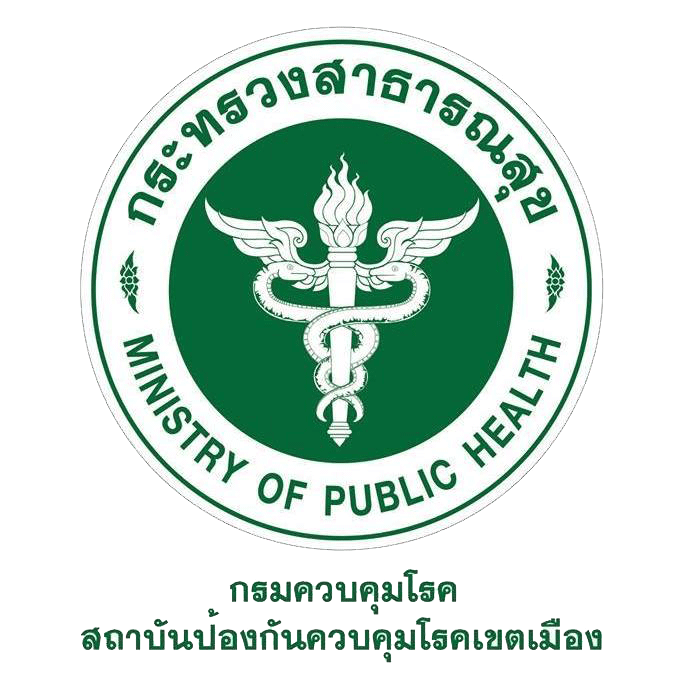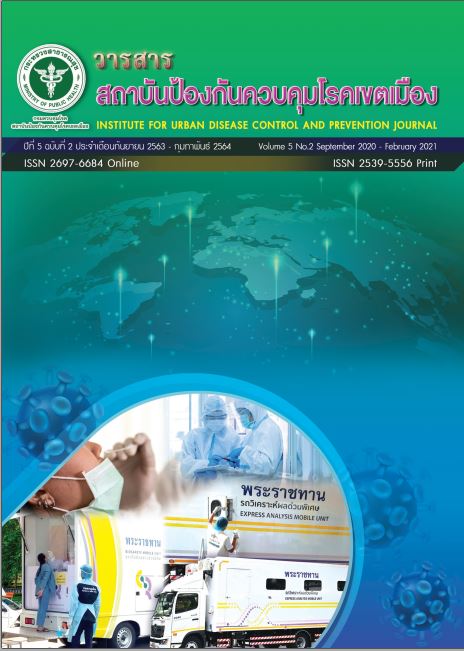ปัจจัยที่ส่งผลต่อคุณภาพชีวิตผู้สูงอายุในพื้นที่เขตเมืองของเขตสุขภาพที่ 3
Main Article Content
บทคัดย่อ
การวิจัยนี้มีวัตถุประสงค์ 1) เพื่อศึกษาปัจจัยระดับพื้นฐาน ปัจจัยด้านจิตลักษณะ และปัจจัยด้านความต้องการของผู้สูงอายุในภาคตะวันออก 2) เพื่อศึกษาคุณภาพชีวิตของผู้สูงอายุด้านสุขภาพกาย สุขภาพจิต สังคม สิ่งแวดล้อม และจิตวิญญาณ และ 3) เพื่อศึกษารูปแบบการดูแลรวมทั้งการพัฒนาคุณภาพชีวิตของผู้สูงอายุ การวิจัยครั้งนี้ใช้วิธีการวิจัยแบบผสมผสานระหว่างการวิจัยเชิงปริมาณและการวิจัยเชิงคุณภาพ กลุ่มตัวอย่างสำหรับการวิจัยเชิงปริมาณประกอบด้วยผู้สูงอายุที่มีอายุตั้งแต่ 60 ปีขึ้นไปจำนวน 400 ราย ได้มาด้วยการสุ่มอย่างง่ายโดยใช้ตารางของ Taro Yamane เครื่องมือที่ใช้ในการเก็บรวบรวมข้อมูลแบบสอบถาม สถิติที่ใช้สำหรับวิเคราะห์ข้อมูลได้แก่ ค่าร้อยละค่าเฉลี่ย และส่วนเบี่ยงเบนมาตรฐาน ส่วนกลุ่มตัวอย่างสำหรับการวิจัยเชิงคุณภาพประกอบด้วยผู้สูงอายุจำนวน 30 ราย ได้มาโดยการสุ่มแบบเจาะจง เก็บรวบรวมข้อมูลด้วยวิธีการสัมภาษณ์เชิงลึกและวิเคราะห์ข้อมูลที่เก็บมาได้โดยการวิเคราะห์เนื้อหา
ผลการวิจัยพบว่า
1) ปัจจัยพื้นฐาน ปัจจัยด้านจิตลักษณะ และปัจจัยด้านความต้องการของผู้สูงอายุมีความสัมพันธ์กัน หากร่างกายป่วยจิตใจก็ป่วยด้วย
2) ผู้สูงอายุที่มีคุณภาพชีวิตที่ดีมาจากครอบครัวที่มีความรักความอบอุ่น นั้นก็คือ สมาชิกในครอบครัวดำรงชีวิตอยู่ร่วมกันด้วยความเป็นน้ำหนึ่งใจเดียวกัน ช่วยเหลือซึ่งกันและกัน ดูแลซึ่งกันและกัน และดูแลผู้สูงอายุอย่างดีที่สุดเท่าที่จะทำได้โดยเฉพาะในด้านอาหารและโภชนาการ
3) รูปแบบที่เหมาะสมสำหรับการดูแลผู้สูงอายุก็คือ สมาชิกครอบครัวเป็นบุคลากรหลักในการดูแลผู้สูงอายุ นอกจากนั้น หน่วยงานภาครัฐและภาคเอกชนจะต้องมีส่วนร่วมอย่างแข็งขันในการดูแลผู้สูงอายุ โดยเน้นสุขภาวะของผู้สูงอายุในทุกด้าน คือ ด้าน ร่างกาย อารมณ์ และจิตวิญญาณ
Article Details
บทความที่พิมพ์ในวารสารสถาบันป้องกันควบคุมโรคเขตเมือง ถือว่าเป็นผลงานวิชาการ งานวิจัยและวิเคราะห์ ตลอดจนเป็นความเห็นส่วนตัวของผู้เขียนเอง ไม่ใช่ความเห็นของสถาบันป้องกันควบคุมโรคเขตเมือง หรือคณะบรรณาธิการแต่ประการใด ผู้เขียนจำต้องรับผิดชอบต่อบทความของตน
เอกสารอ้างอิง
จิราพร เกศพิชญ และคณะ. (2543). ความผาสุกทางใจของผู้สูงอายุ: การศึกษาเชิงคุณภาพ. วารสารพฤฒาวิทยาและเวชศาสตร์ผู้สูงอายุ.
ทิพาภรณ์ โพธิ์ถวิล. (2543). กลไกการบริหารระบบสวัสดิการสังคมผู้สูงอายุไทย. ชุดโครงการวิจัยและพัฒนานโยบายระบบสวัสดิการสังคมเพื่อพัฒนาคุณภาพชีวิตผู้สูงอายุในประเทศไทยคณะสังคมสงเคราะห์ศาสตร์และสวัสดิการสังคม มหาวิทยาลัยหัวเฉียวเฉลิมพระเกียรติคุณภาพชีวิต. (ออนไลน์). แหล่งที่มา: http://www.nu.ac.th (2550).
นันทิญา อังกินันท์. (2545). คุณภาพชีวิตของผู้สูงอายุในชมรมผู้สูงอายุ เขตบางกอกน้อย.ปริญญานิพนธ์ศิลปศาสตรมหาบัณฑิต สาขาไทยศึกษา โครงการบัณฑิตศึกษา สถาบันราชภัฎธนบุรี.
ปัญญภัทร ภัทรกัณฑากุม. (2544). การเข้าร่วมกิจกรรมทางสังคมและความผาสุกทางใจของผู้สูงอายุ วิทยานิพนธ์พยาบาลศาสตรมหาบัณฑิต สาขาวิชาพยาบาลผู้สูงอายุ. กรุงเทพฯ: บัณฑิตวิทยาลัย มหาวิทยาลัยเชียงใหม่.
รุจา ภู่ไพบูลย์. (2541). การพยาบาลครอบครัว : แนวคิดทฤษฎีและการนำไปใช้. พิมพ์ครั้งที่ 3 กรุงเทพมหานคร : วีเจ พริ้นติ้ง.
วรเดช จันทรศร. (2551). ทฤษฎีการนำนโยบายสาธารณะไปปฏิบัติ. กรุงเทพฯ: พริกหวานกราฟฟิค.
วรรณา กุมารจันทร์. (2543). คุณภาพชีวิตของผู้สูงอายุในเขตภาคใต้ตอนบน วิทยานิพนธ์มหาบัณฑิต สาขาพยาบาลผู้สูงอายุ มหาวิทยาลัยมหิดล.
ศศิพัฒน์ ยอดเพชร และคณะ. (2552). ตัวแบบการดูแลผู้สูงอายุที่ดีของครอบครัวและชุมชนชนบทไทย. กรุงเทพ. สถาบันวิจัยระบบสาธารณสุข มูลนิธิสถาบันวิจัยและพัฒนาผู้สูงอายุไทย.
ศิริวรรณ ศิริบุญ. (2543). การตอบสนองต่อปัญหาและความต้องการของผู้สูงอายุ : ศึกษากรณีตัวอย่างการจัดตั้งศูนย์การทางสังคมของผู้สูงอายุ. กรุงเทพฯ. วิทยาลัยประชากรศาสตร์จุฬาลงกรณ์มหาวิทยาลัย.
สํานักงานคณะกรรมการพัฒนาการเศรษฐกิจและสังคมแห่งชาติ. (2557). เอกสารประกอบการ ระดมความคิดเห็น
ทิศทางของแผนฯ ฉบับที่ 12 (พ.ศ. 2560 – 2564). (ดาวโหลดจาก เว็บไซต์ http://www.nesdb. .go.th/
/Default.aspx?tabid=535)
สำนักเลขาธิการคณะรัฐมนตรี. (2540). รัฐธรรมนูญแห่งราชอาณาจักรไทย. กรุงเทพมหานคร: สวัสดิการสำนักเลขาธิการคณะรัฐมนตรี.
สำนักงานสถิติแห่งชาติ. (2547). คุณภาพชีวิตคนไทย. กรุงเทพมหานคร.สำนักสถิติพยากรณ์ สำนักงานสถิติแห่งชาติ.
สุตา ถือมั่น. (2547). ปัจจัยคุณภาพชีวิตของผู้สูงอายุตำบลย่านยาว จังหวัดสุโขทัย. กรุงเทพมหานคร. มหาวิทยาลัยมหิดล.
สมโภชน์ อเนกสุข และกชกร สังขชาติ.(2548). รูปแบบการดำรงชีวิตของผู้สูงอายุเกิน 100 ปี จังหวัด ชลบุรี.วารสาร
ศึกษาศาสตร์ ปีที่ 17 ฉบับ ที่ 1 เดือนมิถุนายน-ตุลาคม 2548.
อัจฉรา รักยุติธรรม และกฤษฎา บุญชัย. (2552). นโยบายแก้ไขปัญหาความยากจนของรัฐบาล อภิสิทธิ์ เวชชาชีวะ. ประชาไทย.
Campbell, A. (1976). Subjective measures of Well-being .American Psychogist, 31 , 117- 124.
Ferrel B. A. et al. (1995). Quality of life in long-term cancer surrvivors. On cology Nursing Forum, 22(6), 915-922
Koufman , H. F. Paticipation Organized Activities in Selected Kentucky Localities . Agricultural Experiment Station Bulletins . March ,1949.
Oakley , P. Approaches To Participation In Rual Development. Geneva : Internation Office, 1984.
Orem, D. E. Nursing : Concepts of practice. (4th ed. ) St. Louis C.V. Mosby, 1985.


